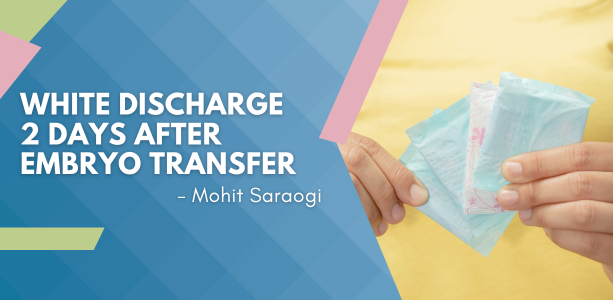
Experiencing white discharge 2 days after embryo transfer can feel confusing, especially when you’re hyper-aware of every change during the crucial two-week wait. Whether it’s thick, light, or slightly creamy, you’re likely wondering—is this a good sign or something to worry about? Here’s the comforting truth: in most cases, it’s perfectly normal. But knowing what’s “normal” versus what’s “concerning” is key to staying calm and informed.
As one of Mumbai’s most respected IVF specialists, Dr. Mohit Saraogi shares, “White discharge 2 days post embryo transfer is usually hormonal. It’s one of the earliest responses your body may show as it adjusts to progesterone support.” In this blog, we’ll explore why it happens, what it may indicate about implantation, and when it’s time to call your fertility clinic. If you’re looking for answers, reassurance, and real medical guidance—you’re in the right place.
Is White Discharge 2 Days After Embryo Transfer Normal?
Absolutely—white discharge 2 days after embryo transfer is not only common but often expected. IVF protocols usually involve progesterone supplements (via injections, vaginal gels, or suppositories), and these can stimulate the cervix and increase vaginal discharge.
📊 Stat Spotlight: A study published in Human Reproduction reports that over 60% of IVF patients experience increased vaginal discharge within 3–5 days of embryo transfer due to hormone fluctuations.
You might notice:
- Clear or white discharge
- A thick or creamy texture
- No foul odor or irritation
Dr. Saraogi’s Note:
“Unless it’s accompanied by a strong odor, itching, or unusual color, white discharge this early is usually a harmless sign of your body responding to IVF medications.”
Curious if your symptoms are normal? Speak with Dr. Saraogi’s team today and get expert clarity on your IVF progress.
But wait, what exactly causes this?
What Are the Possible Causes of White Discharge After Embryo Transfer?
The causes are mostly linked to hormonal changes and fertility medications. Here’s what could be behind that white discharge 2 days post embryo transfer:

Progesterone Support

Embryo Implantation Activity

Vaginal Medication Residue
If you’re using vaginal progesterone (like Crinone or Endometrin), what you see may partly be residue or gel mixed with natural discharge.

Hormonal Shifts

Early Pregnancy Response (Possibly)
Though it’s still too early for definitive signs, early hormonal activity might contribute to increased discharge as your body prepares for implantation.
Let’s connect the dots with what this could mean:
Can White Discharge Be an Early Sign of Implantation or Pregnancy?
Yes, it can be—though it’s not a guarantee. Around 2–5 days post embryo transfer is when the embryo might begin the process of attaching itself to the uterine lining. This stage may trigger mild cramping, spotting, or subtle discharge changes.
🔍 Key Insight: “Thick white discharge after embryo transfer can sometimes indicate increased progesterone activity, which is essential for maintaining early pregnancy,” explains Dr. Saraogi.
However, white discharge on its own—without spotting or implantation pain—should not be taken as a standalone pregnancy symptom. It’s part of a bigger picture that includes:
- Slight body temperature rise
- Breast sensitivity
- Mood shifts
Think you’re seeing early signs of implantation? Schedule a follow-up at Saraogi IVF Centre for personalized feedback and next steps.
But what if things don’t seem quite right?
When Should I Contact My Doctor About Discharge After Embryo Transfer?
While white discharge 2 days post embryo transfer is usually no cause for concern, certain changes should prompt you to reach out:
- Foul-smelling discharge(could signal infection)
- Green or yellow discharge(not typical for hormonal changes)
- Accompanied by itching, burning, or irritation
- Heavy bleeding or clotting(could indicate complications)
💡 Pro Tip: Keep a daily log of your symptoms—this helps your fertility specialist track patterns and intervene early if needed.
Quote from Dr. Saraogi:
“If discharge becomes unusually colored or causes discomfort, don’t wait. Timely action can prevent complications and safeguard your embryo transfer outcome.”
Unsure whether to be concerned? Reach out to our caring specialists at Saraogi IVF Centre for a quick review and peace of mind.
Let’s bring it all together:
Conclusion – What Does White Discharge 2 Days After Embryo Transfer Mean?
White discharge 2 days after embryo transfer is generally your body’s normal, healthy reaction to hormonal support or early uterine activity. Whether it’s thick white discharge after embryo transfer or a lighter, creamy flow—these symptoms alone are rarely a cause for concern.
However, always pay attention to any accompanying changes like color, smell, or irritation. Trust your instincts—and lean on the support of a clinic that listens. With Dr. Mohit Saraogi and his expert team at Saraogi IVF Centre, you’re never left guessing.
Need reassurance or ready for your next step? Book your follow-up consultation with Dr. Mohit Saraogi and get expert insights tailored to your IVF journey.
FAQs
Is white discharge 2 days after embryo transfer normal?
Can thick white discharge after embryo transfer mean pregnancy?
What if the discharge smells bad or causes itching?
How long does this discharge typically last?
Should I stop medication if I notice unusual discharge?
References:
1.American Pregnancy Association – IVF Process & Aftercare
https://americanpregnancy.org/infertility/ivf/
2.Healthline – What to Expect After Embryo Transfer
https://www.healthline.com/health/pregnancy/after-embryo-transfer

